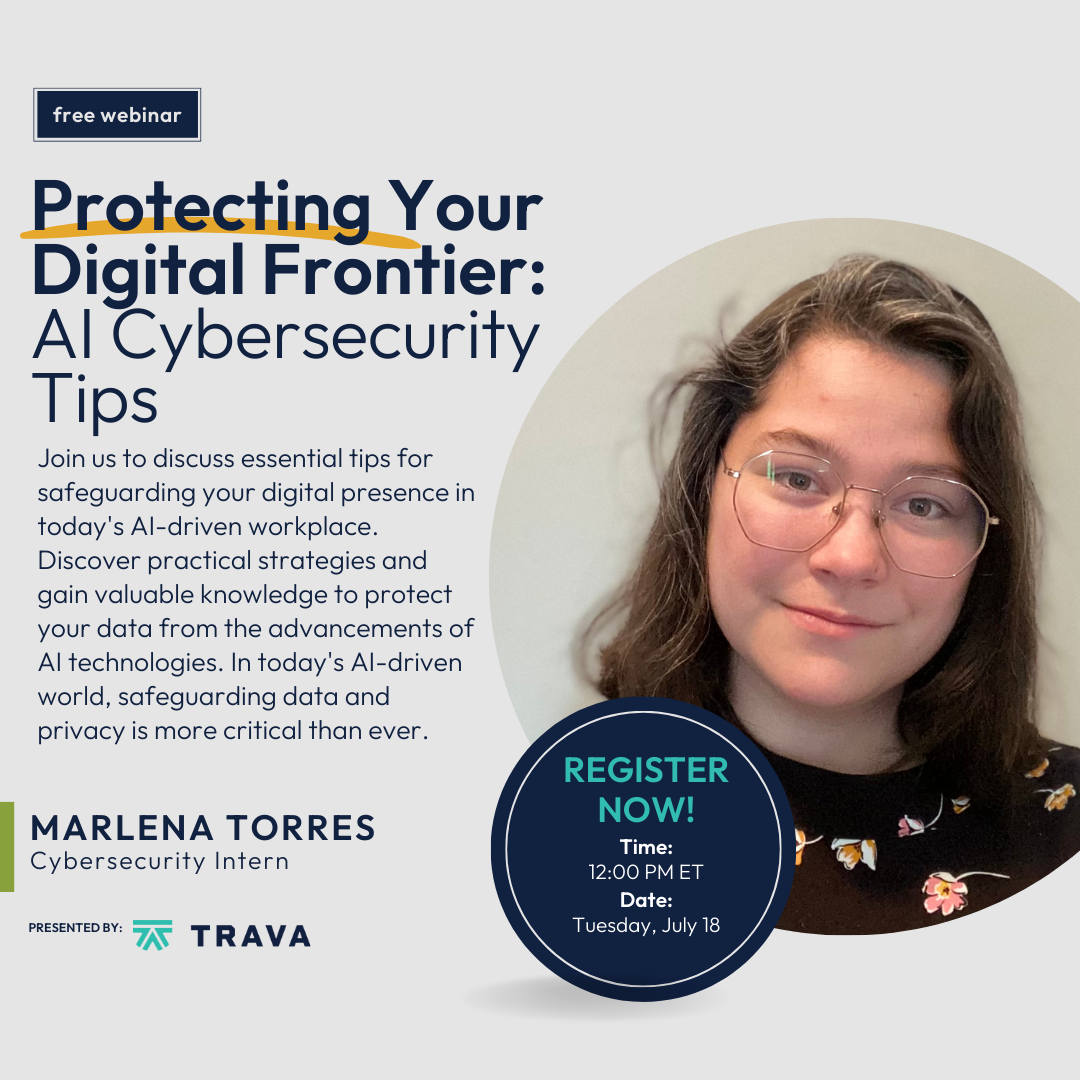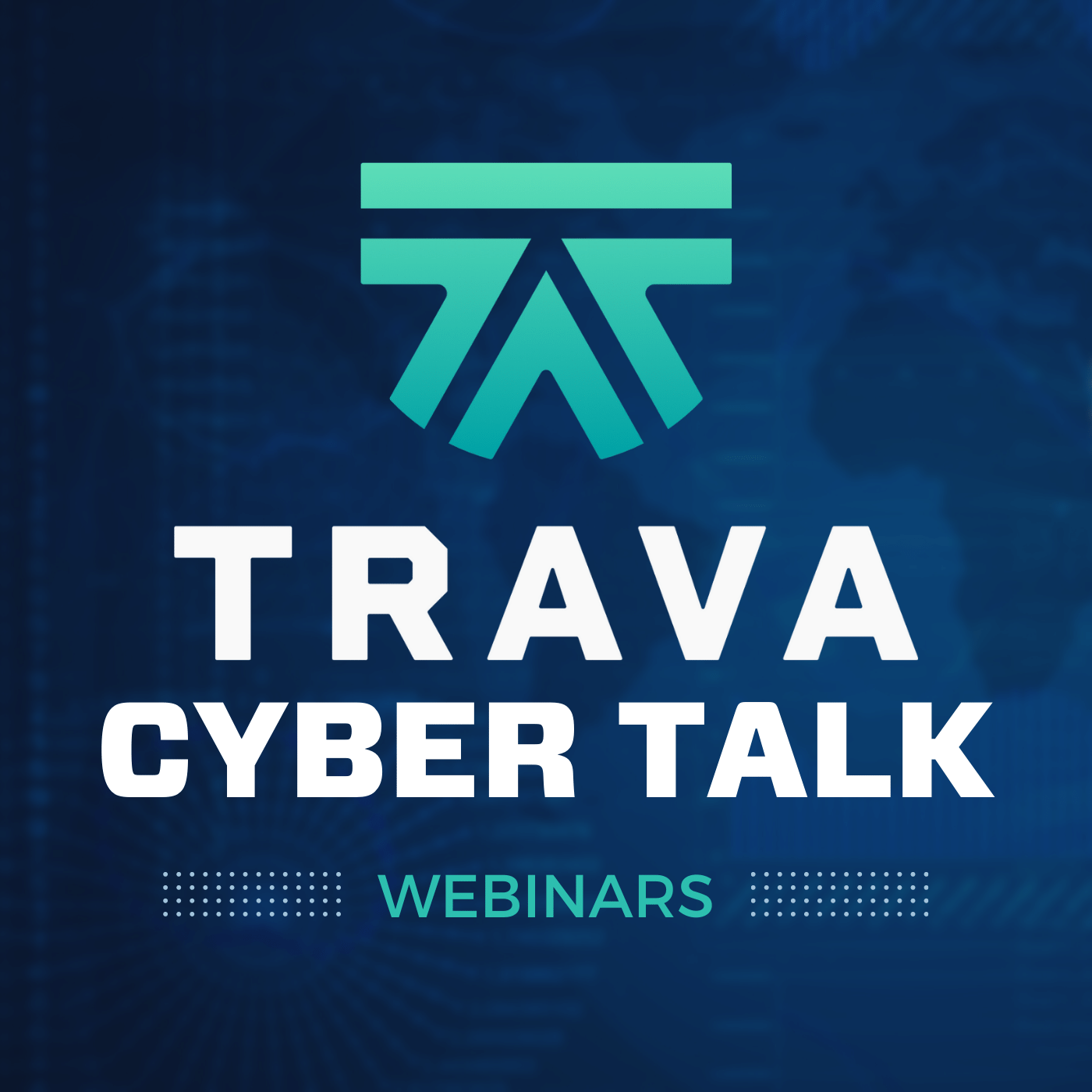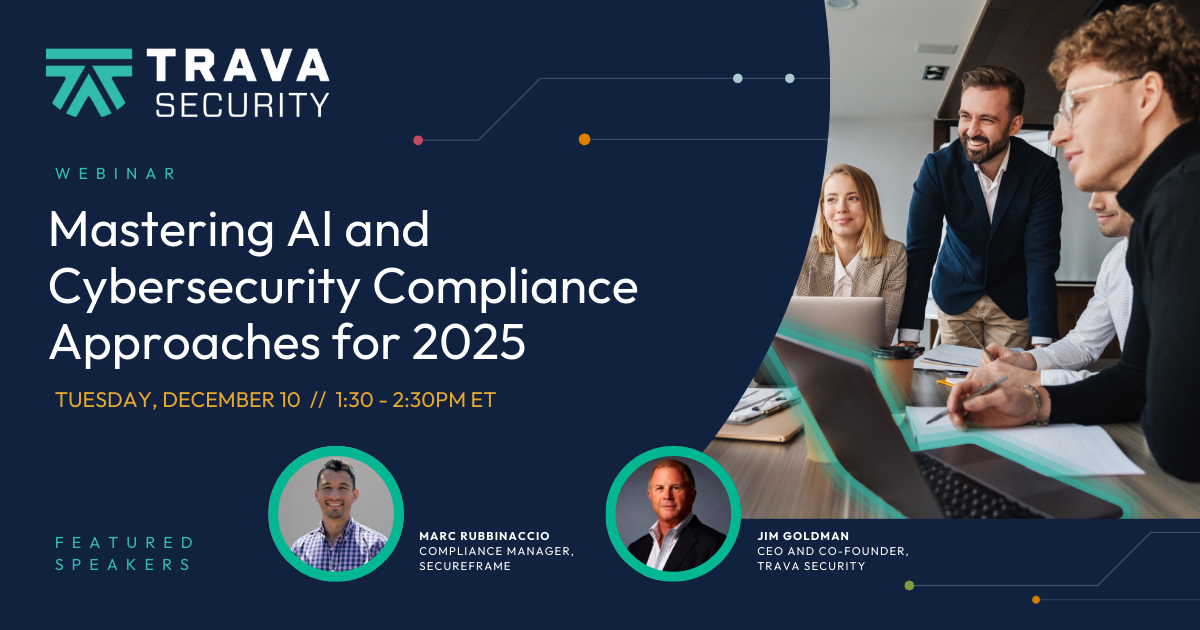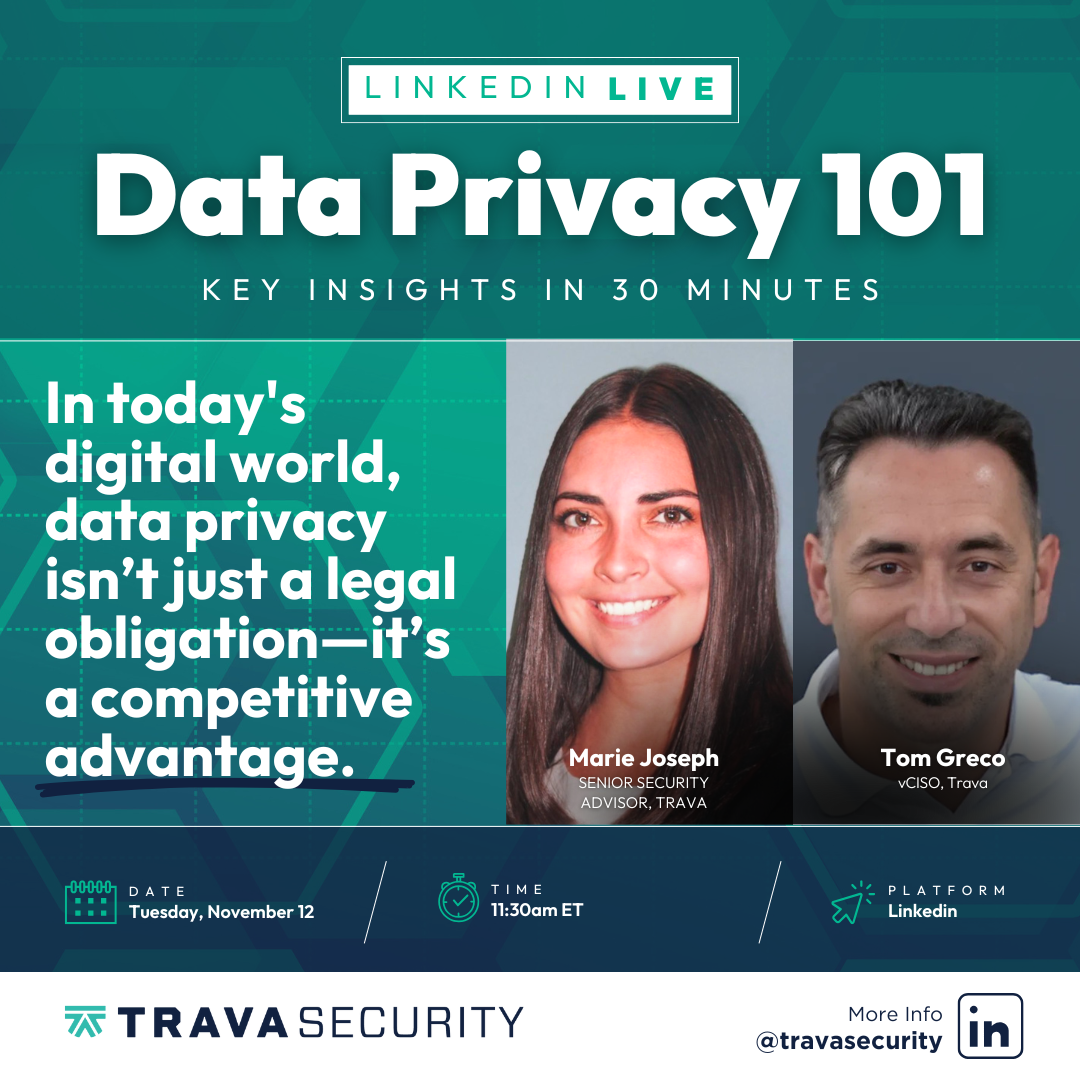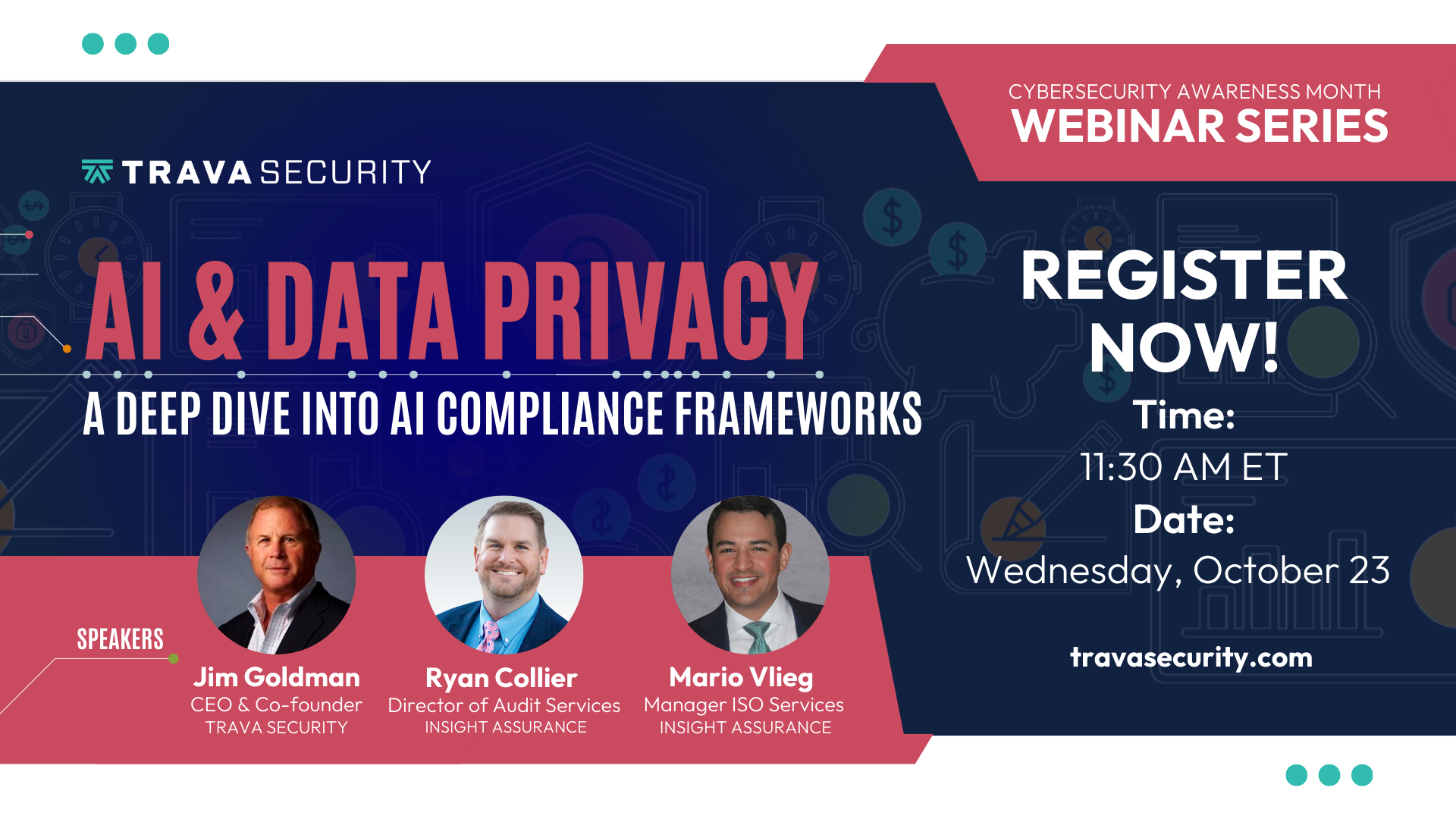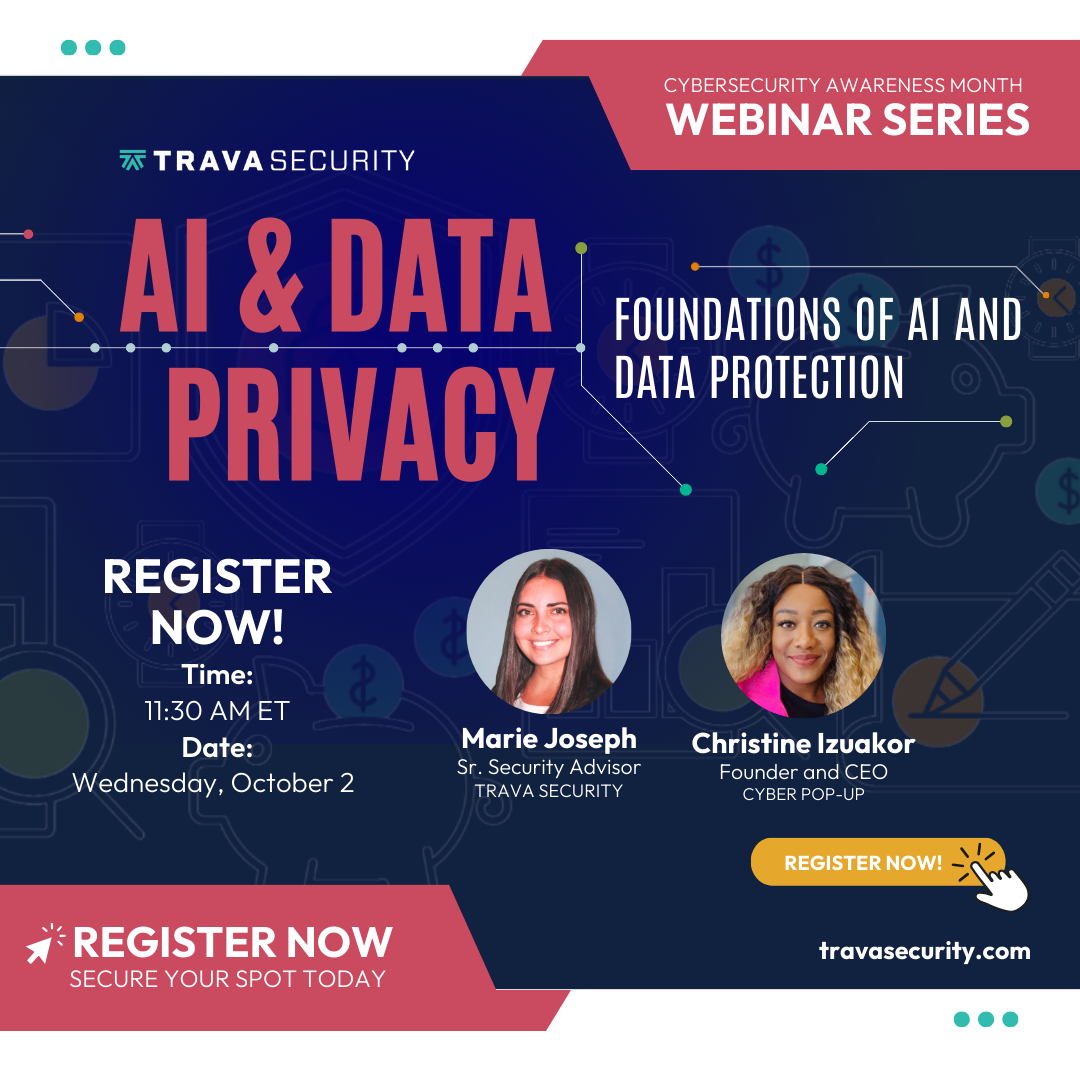Protecting Your Digital Frontier: Essential AI Cybersecurity Tips
- 0.5
- 1
- 1.25
- 1.5
- 1.75
- 2
Jara Rowe: Thank you for joining us today. I am Jara Rowe, the content marketing specialist at Trava, and I appreciate you all being here for this webinar today. We will be going over essential AI cybersecurity tips. I will not be the one presenting, I'm not the expert, I'm just here to help facilitate. So if we want to go over the agenda that we have for today, just to give you a quick snapshot of what's happening, our amazing intern here, Marlena, is the one that we'll be going over everything with you all today. As soon as I shut up talking, she will go intro herself, and then as well, go over different AI plus cybersecurity topics. We have a lot of helpful information here, just good data points. But as well as different tips to help make sure that we all stay safe and secure. And then at the end, we do have time for a Q& A. So if you have any questions that pop up during the presentation, please feel free to use the Q& A option, and we will be able to answer those at the end. Marlena, it's all yours.
Marlena Torres: Hello. So first of all, I hope it's not my data connection, but there in the beginning you kind of froze. So I'm not so sure if it's me, but if it is my apologies. But thank you so much for joining us today for this webinar. My name is Marlena Torres, and I am thrilled to be your presenter for this session. Also, so sorry if you see my cats running around either way. They're a little silly, but what can you do? So in today's day and age, where AI technologies are completely revolutionizing our lives, it is so vital that we understand how to safeguard our digital presence, and protect our valuable information. And that is exactly what we'll be doing today. So throughout this webinar, we'll be exploring the critical connection between AI, cybersecurity, and data privacy. We'll delve into the potential threats that can arise and the utilization of AI, discuss the impact that has on data security, and I'll be providing you with practical tips and best practices to ensure the safety of your digital frontier. Before we start talking about cybersecurity and AI in cybersecurity, I'd like to introduce to you the concept of actual artificial intelligence, and explore its various impacts on our daily lives. So what exactly is AI? In simple terms, AI refers to just machines imitating human intelligence for tasks that require thinking, problem- solving, decision- making. It powers virtual systems like Siri and Alexa, recommendation systems on e- commerce platforms, and even self- driving cars. AI has two key features. The first is a learning, where AI systems analyze data to improve over time. The second is reasoning, allowing AI to make logical deductions based on its available information. For instance, Siri and Alexa understand regular human conversation, and so if they use natural language and provide responses using AI. Recommendation systems analyze customer behavior for personalized suggestions, which is probably why you keep seeing the same five pillows you just ordered from Amazon Prime Day continuously pop up in ads. It also helps self- driving cars rely on AI to navigate and make real- time decisions. AI has become an integral part of our lives, enhancing various industries and improving the way we work and interact with technology. Its impact is far- reaching and it extends beyond just cybersecurity. So let me explain to you how AI can benefit and empower individuals in their business endeavors or just day- to- day. One significant impact of AI is its ability to automate repetitive tasks. Have you ever been watching Netflix and thought, wow, this movie looks perfect for me? That's actually AI at work, analyzing your preferences and past behaviors to provide tailored suggestions. AI algorithms can sift through vast amounts of data and identify patterns to make accurate predictions and recommendations, saving us a lot of time and effort. In customer service, AI has completely reshaped online support with chat- bots and virtual assistants offering immediate response and resolving common issues. These intelligence systems provide personalized interactions, enhancing the overall customer experience. AI also plays a vital role in information organization and retrieval. Search engines, social media algorithms, and content recommendation systems all use AI to understand interests and deliver relevant content. Making information access more efficient and personalized. Even in healthcare, AI has the potential to transform patient care and medical research. AI- powered systems can analyze patient data and medical research at a speed and scale that surpasses regular human capabilities, leading to a lot more accurate diagnoses, faster drug discoveries, and improved patient outcomes. Essentially, AI is a super powerful technology that impacts our lives in numerous ways. It can automate tasks, it can improve customer service, enhances information retrieval, et cetera. It can even revolutionize our healthcare. So by employing AI, one can benefit from increased efficiency, personalization, and innovation. Also, please keep in mind when you hear the term AI, it may be referring to any of the scenarios I previously mentioned, or another scenario entirely. But not every single business utilizes the exact same type of AI system. An AI in one company may be entirely in- house and self- built, in another company, they may use a free open- source application. All of these AI types and systems can be really overwhelming to use, let alone understand the nuances of cybersecurity in that specific AI system. So if exploring AI has you interested, but you don't want to delve too deep into this ever- expanding world of AI, a good place to start would probably be ChatGPT. You might've heard of it, but this AI powerhouse has a ton to offer you with numerous features and capabilities that can seriously expand your horizons. So of course, when you're utilizing AI systems like ChatGPT, it is super important to prioritize your safety and the security of your data. So while the potential for learning and discoveries is great, it's always smart to exercise caution and be mindful of the info you share with the system. So by having a vigilant approach and following some best practices, you'll be able to dive head- first into the benefits that ChatGPT and other AI tech have to offer. All while keeping yourself and your data safe and protected. And we'll get more in the ChatGPT in just a bit, so please just bear with me. And now that we've talked about what AI is, and the actual impact on daily lives, I'd like to go ahead and discuss the actual threats to your data and personal privacy that come along with using AI, and the internet in general. It is a super important topic that affects us all, the threats to data and personal privacy in the realms of cybersecurity and AI. Our digital lives are filled with valuable information, and it is critical to understand the potential risks we face in this world. So there are different kinds of threats that can harm our personal information and privacy. How can some of these threats affect you and how can they relate to AI, you might ask? Well, there is malware and ransomware. These are malicious software programs that can infect our computers, our phones, our tablets. They can sneak into our devices, they can access our sensitive information without permission. And AI is being used by threat actors or hackers to make these programs smarter and harder to stop. This means it's more difficult for the good guys to protect our devices and keep our information safe. Furthermore, there's phishing attacks, where sometimes threat actors try to trick us into giving our personal information, like our passwords, our account information, our credit card numbers. And they do this by sending fake emails, or setting up fake websites that look real. AI is being used to make these tricks even more convincing and even more personalized towards you. This makes it a lot harder for us to tell if an email or website is fake. Which again, puts our personal information at risk. There's also the possibility of data breaches. When companies or organizations don't have proper security measures in place, threat actors can break into their system and steal a lot of personal or important data. AI can both help the good guys and the bad guys in this situation. The bad guys can use AI to find weaknesses in computer systems, making it easier for them to break in. On the other hand, it's also for the good guys because they can use AI to detect and stop these attacks more quickly. There's also social engineering, where sometimes threat actors try to manipulate us into giving them our sensitive information because they may be pretending to be someone they're not, or use psychological tricks to make us trust them. AI can make these manipulations even more realistic and convincing again. For example, they can use an AI- powered chat bot to have conversations with us that seem like we're talking to a real person, making it harder for us to realize that we're being tricked. To sum it up, the threats of malware, ransomware, phishing attack, data breaches, identity theft, all the cybersecurity threats are made more dangerous by the use of artificial intelligence. It's important for us to be aware of these threats so we can stay alert and vigilant. And for cybersecurity experts to stay updated on AI advancements so they can develop better ways to protect us and our information. The utilization and integration of AI into different aspects of our lives brings with it some additional concerns regarding your data and privacy. There can be unauthorized access, where AI systems often need a lot of data to make accurate predictions and learn. Unfortunately, this also means that there's a lot more data at risk of being accessed by hackers who want to get their hands on personal or sensitive information without permission. There's also the possibility of privacy invasions while utilizing AI. This is because AI systems collect and analyze a ton of personal data to provide useful services, but sometimes this can unintentionally intrude on an individual's privacy. This becomes a concern when data is shared without consent, or is used for targeted advertising, potentially revealing a lot more about us than we'd like. There can also be bias or discriminatory outcomes. If an AI system is trained on biased or discriminatory data, or learns from it, they can end up making decisions that are unfair or discriminate against a certain group of people. This happens when the AI learns from data it's given. And if that data has biases, the AI may reproduce those biases in its decisions and its responses towards any queries or questions. There's also a lack of transparency in AI algorithms because they can be quite complex, making it difficult for us to understand how they arrive at their decisions or responses. This lack of transparency raises concerns about fairness, ethics, and accountability. We want to ensure that AI systems are making decisions in a way that can be understood and justified by us, given their response. So by recognizing these threats and understanding the risks they pose to our data and personal privacy, we can take steps to address them. So it's important to implement effective measures to mitigate these concerns and promote responsible practices. The threats to data and personal privacy are constantly present in the realms of cybersecurity and AI. So from malware and phishing to data breaches and privacy invasion, it's crucial to remain vigilant and well- informed. So by confronting these challenges directly, we can strive to create a safer digital environment that respects data privacy and encourages the responsible use of AI. And so, while we've discussed the potential threats to data and personal privacy in AI, it's also really important to acknowledge that AI technologies such as ChatGPT also bring tremendous value to enhance our digital experiences. So before I start talking more about it, let me go ahead and explain ChatGPT, for those of you who might not be familiar with it. ChatGPT is a super advanced AI- powered chatbot developed by a company called OpenAI. It utilizes natural language processing techniques to engage in regular human- like conversations. So in other words, ChatGPT can understand and respond in a way that feels personalized and intelligent. Imagine having a conversation with ChatGPT, where you can ask questions, seek information, or even receive tailored recommendations. ChatGPT's ability to analyze and comprehend natural language makes it a valuable tool for a wide range of applications, from customer service interactions to content curation and personalized assistance. However, as we embrace the benefits of ChatGPT and other AI technologies, it is vital to prioritize digital security and data privacy. So safeguarding your valuable information becomes paramount, ensuring that your interactions with ChatGPT and other AI tech remain both beneficial and secure. Understanding digital security and data privacy is really important for safely navigating the digital landscape and utilizing AI. Just as we need to protect our personal information online, ensuring data security is vital when utilizing AI technologies. These security measures protect our online information from unauthorized access, data breaches, identity theft, and other cyber threats. Understanding these digital security tips becomes even more crucial in the context of AI technologies that rely on collecting and processing our data, or anything that you input into it. So let's go ahead and talk about these, and how anybody can use them to keep their data safe. And by the way, while I'm specifically talking about AI in this instance, you can keep these in mind whether you're interacting with AI or not. These tips are simple, yet effective ways to protect your valuable data while being online and ensuring a safer experience with AI technologies such as ChatGPT. So first, there is using a strong and unique password. It is crucial for AI safety, especially with AI platforms such as ChatGPT. So when creating an account or accessing any sort of AI platform, choose a password that's difficult to guess, and not use for any of your other accounts. This can prevent any sort of unauthorized access to your ChatGPT account, and ensures the security and confidentiality of your conversations and interactions. Next, you should always enable two- factor authentication for your accounts. Two- factor authentication as an extra layer of security by requiring a second verification step, usually through a code sent to your phone or something like that of the sort one logging onto your account. This assures that even if someone does gain access to your password, they won't be able to log in without additional verification. And so by focusing on strong, unique passwords, enabling 2FA, you can enhance the security and safety of your interactions with AI systems online. And these measures help protect your ChatGPT account, your Google Bard account, any sort of conversation or personal information, from any sort of unauthorized access or misuse. There's also more further tips moving on to additional ones. The first one is definitely be cautious while utilizing AI. Exercise caution and be mindful of any of the links you might receive. Because AI may suggest links as a source of information to you based on your question to it. Before clicking on a suggested link, take a moment to evaluate its credibility and source. If you're uncertain about its legitimacy or safety, consider not clicking on the link and instead evaluating its credibility. Look at the URL. Is it a bunch of random letters and numbers with a. com, or is it a straightforward forbes. com/ this is your answer? Or you could copy and paste a link it gives you into a service like Google Transparency report safe browsing site to check its safety. And that's where Google will go and analyze the URL for you and let you know if it has any sort of malicious content or not. By being cautious and taking these steps, you can protect yourself from potential risks associated with unknown or suspicious links. It's also important to be attentive while utilizing AI, I'm so sorry, by paying attention to copyright material when reviewing the output provided by AI systems. If you suspect an AI is utilizing copyright material, please consider utilizing something like, sorry. Please consider using a plagiarism detection site such as Grammarly or Easybib. It's pretty important because AI is, again, always learning. And it also pulls its information directly from the internet. And so it may occasionally provide you false direct copyright material or malicious information. So it is very important to double check the AI's output for accuracy and reliability. By being attentive and verifying the content, you can maintain the integrity of the information that you generate and share. It's also important to be mindful when engaging in conversations with AI. Exercise caution and be mindful of the personal or sensitive information you might share with it. Treat the AI as a stranger, and avoid disclosing anything you wouldn't tell someone you just met. Protect your privacy and security by being mindful of the information you share. Keep in mind that AI systems, including chat GPT, continuously learn and improve through user- provided data. So to prioritize your security ensures a thorough anonymization of your data, and refrain from sharing anything personal or sensitive with the AI. And on that note, be proactive while utilizing AI. You can do this by disabling the chat saving function. This can enhance your security, and reduce the risk of falling victim to cybercrime. By opting out of chat log storage, you can protect your privacy by preventing any sort of sensitive conversations from being stored on your device, your account, or the server. This reduces the likelihood of unauthorized access to your chat logs in the case of a data breach. By taking this proactive step, you can actually ensure that the sensitive information remains confidential, and minimize the potential impact of security incidents. Prioritize the security of your information by making informed decisions about the storage of your chat logs. And lastly, be vigilant. While utilizing AI chat bots, stay alert for any signs of suspicious activity. Examples of these would be unsolicited messages or links, requests for personal information, or any sort of weird or unexpected behavior from the AI. If you encounter such activity, take immediate steps to address a situation, such as contacting your security team, or reporting it to any sort of relevant channel for suspicious activity. And by focusing on these tips, which is using a strong password, enabling 2FA, being cautious with AI- provided links, being attentive to copyright material, and being mindful of the information you share, you can enhance the security and safety of your interactions with AI systems such as ChatGPT. These metrics help protect your personal data, it can help you respect intellectual property rights, and maintain your privacy and security. So remember, digital security is an ongoing effort. Stay vigilant, stay informed about emerging threats, and educate yourself about best practices in AI safety and general cybersecurity. Hopefully by taking these steps, you can navigate the digital world with confidence and peace of mind, protecting your valuable data and maintaining your privacy and security. And with that, thank you so much for joining us in this webinar, and I really hope these practical AI security tips will assist you in protecting your digital frontier. So please stay safe and secure in digital endeavors, and I will now be open to questions.
Jara Rowe: All right, fantastic. We do have a few questions and I would like to kick that off with, when it comes to what you use personally, AI tools, what's your go- to tool?
Marlena Torres: So it depends on the situation. There's two go- to tools for me. The first one is ChatGPT. When I am writing a poem, writing a story, ChatGPT is really good with creative writing. But if I have a question that's like, what phase is the moon in right now? I would go to use Google Bard, which is Google's AI. That's because Google Bard is up- to- date and pulls relevant information directly from the internet, whereas ChatGPT's data might be a little outdated, and cannot pull from the internet just like Google Bard can.
Jara Rowe: Awesome. So you were just answering this question, but I was also just typed. So I just want you to reiterate, what are the differences between ChatGPT and Google Bard?
Marlena Torres: So ChatGPT, its data pool is from, I believe, late 2021 or within the year of 2022. ChatGPT is, again, good with creative writing, and it's good at analyzing code. You can say, " Please write me an entire PowerPoint for kids and write it about elephants," and it'll write a tailored PowerPoint for kids to understand what elephants are. Where if you ask Google Bard that exact same question, it'll probably say, I don't know what you're talking about, I can't answer that. So Google Bard is a lot more, give me what's the exact formula for the speed of light. That's what you ask Google Bard instead. So that's the difference, basically.
Jara Rowe: Awesome. So if I were a new user to ChatGPT, since it is a relatively new tool, what are other resources,, aside from this webinar now that people could use?
Marlena Torres: So something that I highly recommend is just using ChatGPT. Because a lot of times, nine times out of 10, if you have a question about it, you want to learn more about it, you can ask it, itself. It's a very bizarre feeling, talking to ChatGPT sometimes. Because it is such a advanced technology, it feels like texting somebody sometimes. So if you want more information or you're confused, you can just be straight up, you can use slang, you can use jargon. Just ask ChatGPT. There's also a lot of content on YouTube. There's content on LinkedIn, or just regular Google.
Jara Rowe: Awesome. All right. So how does AI use personal information?
Marlena Torres: So AI in general, there's a lot of different type of AI, like I was saying. But AI utilizes personal information by learning from it. It's registered to a database, it collects it, archives it, and let's say that you say, what's two plus two? And it says four, right? Let's pretend that nobody knows what two plus two is. If two months down the line somebody else comes up to ChatGPT and they're like, what's two plus two? They'd be like, ah, two months ago I had this exact same question, and I'll use your data to make a new answer for this user asking something else basically.
Jara Rowe: Got it. So just to reiterate, something I took away from the webinar is that if I turn off that chat function, then it doesn't have the capability to use that information.
Marlena Torres: It shouldn't. That is correct. It should not have the capability.
Jara Rowe: Okay. All right. So what if someone didn't want to use ChatGPT?
Marlena Torres: They could use, there is a million types of things like ChatGPT or an AI system similar again, such as Google Bard. Bing also has its own AI from Microsoft. Microsoft Bing has its own AI you can use, I'm pretty sure it's just called Bing AI. You could also use some free open- source applications that people in the AI community have made. I think one is called Hugging Friends. There's a ton of them. Some of them are really out there, and some of them are regular and verified by Microsoft. So if you don't want to use ChatGPT, there is a million other kinds of things you could use. Just look up ChatGPT lookalikes, basically.
Jara Rowe: Cool. So another follow- up question to personal information. So it's possible for someone's personal info to be leaked or breached through using AI?
Marlena Torres: Yes, actually. There was an article, I didn't have it on hand at the moment, but there was an article not too long ago that was shared around ChatGPT's databases were breached, actually, and a bunch of information was let out. So it depends on the type of breach, first of all. It can either just be your account information, or it can be its actual archive and database of user questions and responses. So your information can be taken in a number of ways. So as long as you're aware, and cautious, and not asking outright company questions with ChatGPT, and you're using strong passwords for your account, you should be okay.
Jara Rowe: So helpful. So I have one other question. If anyone else has anything, please feel free to type it in. So how can we keep our sensitive information safe? So if we were giving ChatGPT a writing prompt, do you have examples of the best way to save our sensitive information?
Marlena Torres: Yeah, so to think of an example like that, when I said anonymizing your data, the biggest example, if you're using ChatGPT specifically, is I guess for programmers. I would highly and strongly encourage you to not just copy and paste your code because it can analyze code snippets, right? So if you type out your code for whatever program you're working on, and you're having an issue, don't copy and paste it in the ChatGPT line from line. Try to use error codes like, oh, I got this error code when making a program that's supposed to run a calculator, what could be wrong with it? Instead of just copying your data right into it. Or for financial planners, or let's say you have a new business deal, and you want ChatGPT to be specific about what it says back. So you say, " I have a business deal with Google and I want to know how to make it more profitable." You wouldn't say that. You should probably say something along the lines of, " I have a potential business deal with a big client. How would you recommend that I go about the situation?" Instead of saying directly what you're doing, is what I would say.
Jara Rowe: Awesome. So one more question.
Marlena Torres: Okay.
Jara Rowe: And I've done this several times myself, as I'm not a cybersecurity expert, we know that. But there have been times where I've put something in ChatGPT about some topic I've heard, just wanting more information. But since I'm not an expert, I don't know if it's accurate. How can I verify if an answer is accurate or not?
Marlena Torres: So for that one, there are a number of ways to do that. So depending on your question and the outcome, let's say it's more of a scientific question, more of a question that can be answered through Google, but you asked ChatGPT. If you're unsure, you can take your exact same prompt and put it into a different AI system. You could utilize Google, you could copy and paste... Again, with ChatGPT. It is so human, you could be like, explain this further. Where did you find this information? Give me exactly what you're talking about. You can continue to prompt ChatGPT to give you more and information. So if you're unsure and you want to verify, keep asking it. And if you're still unsure, use Google. Use a different AI system. Just use any sort of resource you have if you're unsure about the actual contents of this response.
Jara Rowe: Awesome, that's super helpful. So if there are no other questions for Marlena, we will wrap up this webinar.

